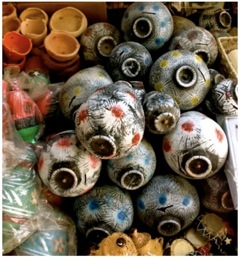By Nihal Zaroug.

Tripoli, 18 August:
Ramadan is coming to a close on Sunday, and if you have been going out after Iftar these past . . .[restrict]few days in Tripoli or Benghazi, you will have noticed that traffic all around has increased. Streets are filled with people looking for that perfect Eid outfit. Young and old, out shopping for new clothes to show off during end of Ramadan festivities known as Eid Al-Fitr.
Eid is celebrated for three days and in Libya, a new outfit for every day and new toys for the children is customary. Small stalls have sprung up everywhere, as young men looking to make some quick money sell clothes and inexpensive toys for the occasion.

For children more than adults, the emphasis on new clothes from head to toe is of utmost importance. For young girls an outfit, usually an elaborate dress is not complete without decorated socks, matching hairclips, jewelry and typically white shoes. Young boys, depending on their parents’ taste, will don suits with dress shirts or traditional Libyan costume and, similar to the girls, the outfits’ accessories must be new. This also includes wallets and purses, used for keeping monetary gifts known as eidyah.
Eidyah is given to children and teenagers by parents, relatives and friends when visiting. Typically visits commence after Salat Al-Eid, this is a special prayer on the morning of the first day of Eid, and visits are carried out till the end of Eid.
For Salat Al-Eid, men and boys wear the traditional Libyan costume. Women also attend morning prayers, however the majority stay in to greet visitors and prepare a heavy morning meal.
After prayers, it is customary to have breakfast with family, which consists of fteera (flat bread) with honey or galaya (meat stew). Countless households also make aseeda (doughy flour porridge) with honey or with ruub (date syrup). A truly fitting breakfast for a holiday that celebrates the end of fasting.
Many families designate which days to visit the father’s or mother’s side of the family, and usually leave the last day for outings, eating out at restaurants, and shopping for toys by children who are not keen on saving their eidyah. Nearly all stores are closed during Eid but toy stores and corner stores stay open, counting on children to spend their eidyah on games and candy, with little protest from parents because it is Eid!
The money savvy child, who hopes to make a small fortune during Eid and plans on saving it, may buy a Libyan clay money pot known as a ‘shig-gaga’. These are often sold at the impromptu stalls around town. A bit of money saving would not be so bad, as Eid outfits, ediyahs, food and sweets associated with the holidays can be pricey. [/restrict]






